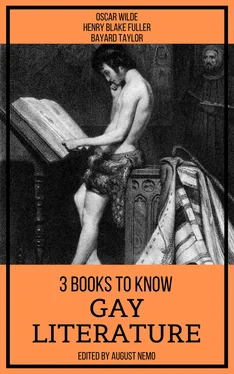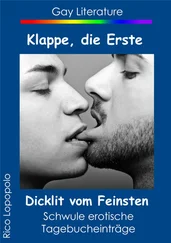“Well, I found myself seated in a horrid little private box, with a vulgar drop-scene staring me in the face. I looked out from behind the curtain, and surveyed the house. It was a tawdry affair, all Cupids and cornucopias, like a third-rate wedding cake. The gallery and pit were fairy full, but the two rows of dingy stalls were quite empty, and there was hardly a person in what I suppose they called the dress-circle. Women went about with oranges and ginger-beer, and there was a terrible consumption of nuts going on.”
“It must have been just like the palmy days of the British Drama.”
“Just like, I should fancy, and very depressing. I began to wonder what on earth I should do, when I caught sight of the play-bill. What do you think the play was, Harry?”
“I should think ‘The Idiot Boy, or Dumb but Innocent.’ Our fathers used to like that sort of piece, I believe. The longer I live, Dorian, the more keenly I feel that whatever was good enough for our fathers is not good enough for us. In art, as in politics, les grandpères ont toujours tort.”
“This play was good enough for us, Harry. It was ‘Romeo and Juliet.’ I must admit that I was rather annoyed at the idea of seeing Shakespeare done in such a wretched hole of a place. Still, I felt interested, in a sort of way. At any rate, I determined to wait for the first act. There was a dreadful orchestra, presided over by a young Hebrew who sat at a cracked piano, that nearly drove me away, but at last the drop-scene was drawn up, and the play began. Romeo was a stout elderly gentleman, with corked eyebrows, a husky tragedy voice, and a figure like a beer-barrel. Mercutio was almost as bad. He was played by the low-comedian, who had introduced gags of his own and was on most friendly terms with the pit. They were both as grotesque as the scenery, and that looked as if it had come out of a country-booth. But Juliet! Harry, imagine a girl, hardly seventeen years of age, with a little flower-like face, a small Greek head with plaited coils of dark-brown hair, eyes that were violet wells of passion, lips that were like the petals of a rose. She was the loveliest thing I had ever seen in my life. You said to me once that pathos left you unmoved, but that beauty, mere beauty, could fill your eyes with tears. I tell you, Harry, I could hardly see this girl for the mist of tears that came across me. And her voice — I never heard such a voice. It was very low at first, with deep mellow notes, that seemed to fall singly upon one’s ear. Then it became a little louder, and sounded like a flute or a distant hautbois. In the garden-scene it had all the tremulous ecstasy that one hears just before dawn when nightingales are singing. There were moments, later on, when it had the wild passion of violins. You know how a voice can stir one. Your voice and the voice of Sibyl Vane are two things that I shall never forget. When I close my eyes, I hear them, and each of them says something different. I don’t know which to follow. Why should I not love her? Harry, I do love her. She is everything to me in life. Night after night I go to see her play. One evening she is Rosalind, and the next evening she is Imogen. I have seen her die in the gloom of an Italian tomb, sucking the poison from her lover’s lips. I have watched her wandering through the forest of Arden, disguised as a pretty boy in hose and doublet and dainty cap. She has been mad, and has come into the presence of a guilty king, and given him rue to wear, and bitter herbs to taste of. She has been innocent, and the black hands of jealousy have crushed her reed-like throat. I have seen her in every age and in every costume. Ordinary women never appeal to one’s imagination. They are limited to their century. No glamour ever transfigures them. One knows their minds as easily as one knows their bonnets. One can always find them. There is no mystery in any of them. They ride in the Park in the morning, and chatter at tea-parties in the afternoon. They have their stereotyped smile, and their fashionable manner. They are quite obvious. But an actress! How different an actress is! Harry! why didn’t you tell me that the only thing worth loving is an actress?”
“Because I have loved so many of them, Dorian.”
“Oh, yes, horrid people with dyed hair and painted faces.”
“Don’t run down dyed hair and painted faces. There is an extraordinary charm in them, sometimes,” said Lord Henry.
“I wish now I had not told you about Sibyl Vane.”
“You could not have helped telling me, Dorian. All through your life you will tell me everything you do.”
“Yes, Harry, I believe that is true. I cannot help telling you things. You have a curious influence over me. If I ever did a crime, I would come and confess it to you. You would understand me.”
“People like you — the wilful sunbeams of life — don’t commit crimes, Dorian. But I am much obliged for the compliment, all the same. And now tell me — reach me the matches, like a good boy: thanks:— what are your actual relations with Sibyl Vane?”
Dorian Gray leaped to his feet, with flushed cheeks and burning eyes. “Harry! Sibyl Vane is sacred!”
“It is only the sacred things that are worth touching, Dorian,” said Lord Henry, with a strange touch of pathos in his voice. “But why should you be annoyed? I suppose she will belong to you some day. When one is in love, one always begins by deceiving one’s self, and one always ends by deceiving others. That is what the world calls a romance. You know her, at any rate, I suppose?”
“Of course I know her. On the first night I was at the theatre, the horrid old Jew came round to the box after the performance was over, and offered to take me behind the scenes and introduce me to her. I was furious with him, and told him that Juliet had been dead for hundreds of years, and that her body was lying in a marble tomb in Verona. I think, from his blank look of amazement, that he was under the impression that I had taken too much champagne, or something.”
“I am not surprised.”
“Then he asked me if I wrote for any of the newspapers. I told him I never even read them. He seemed terribly disappointed at that, and confided to me that all the dramatic critics were in a conspiracy against him, and that they were every one of them to be bought.”
“I should not wonder if he was quite right there. But, on the other hand, judging from their appearance, most of them cannot be at all expensive.”
“Well, he seemed to think they were beyond his means,” laughed Dorian. “By this time, however, the lights were being put out in the theatre, and I had to go. He wanted me to try some cigars that he strongly recommended. I declined. The next night, of course, I arrived at the place again. When he saw me he made me a low bow, and assured me that I was a munificent patron of art. He was a most offensive brute, though he had an extraordinary passion for Shakespeare. He told me once, with an air of pride, that his five bankruptcies were entirely due to ‘The Bard,’ as he insisted on calling him. He seemed to think it a distinction.”
“It was a distinction, my dear Dorian — a great distinction. Most people become bankrupt through having invested too heavily in the prose of life. To have ruined one’s self over poetry is an honour. But when did you first speak to Miss Sibyl Vane?”
“The third night. She had been playing Rosalind. I could not help going round. I had thrown her some flowers, and she had looked at me; at least I fancied that she had. The old Jew was persistent. He seemed determined to take me behind, so I consented. It was curious my not wanting to know her, wasn’t it?”
“No; I don’t think so.”
“My dear Harry, why?”
“I will tell you some other time. Now I want to know about the girl.”
Читать дальше












